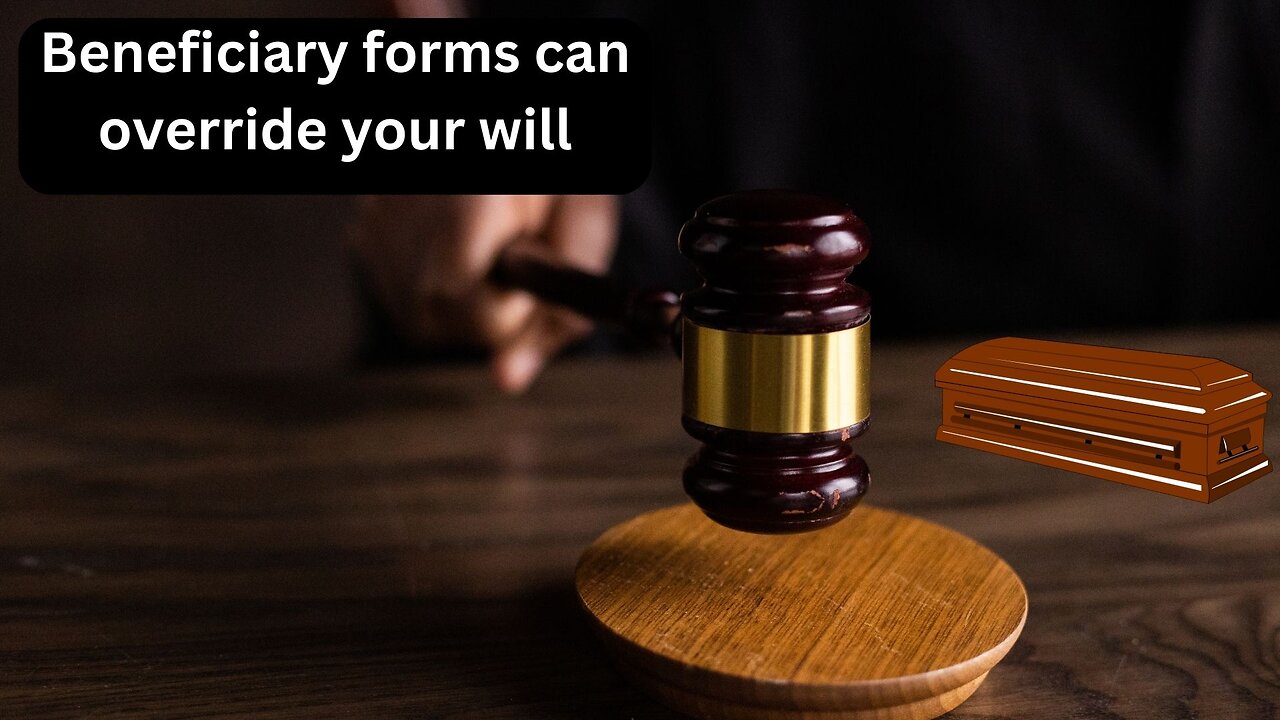Premium Only Content

Beneficiary forms can override your will
Beneficiary forms can override your will
If you assume your will is your final word on what happens to your assets when you die, they may end up going to an ex-spouse or caught up in a lengthy court battle. This issue is becoming more pronounced as Americans juggle multiple retirement, insurance, and bank accounts.
When you sign up for a 401(k) plan at work, you will be asked to name beneficiaries. These are the people that will inherit your account if you pass away. Usually you will name a primary beneficiary who is your first choice to receive the assets, but you also may name contingent beneficiaries who are essentially backup if the primary beneficiary dies before you do. You should take this very seriously or else the 401(k) will end up in probate court which can be expensive and slow. Even if you do have a will, naming 401(k) beneficiaries makes the inheritance process much quicker and less expensive.
You could write volumes about nightmare beneficiary situations. A spouse for less than a year can end up with the entire retirement plan instead of the participant’s underage child. People will put former friends from decades ago on beneficiary forms and forget about both the forms and the friends.
Plans often have a hierarchy that omits partners, friends, and other relatives in favor of spouses, children, parents, and siblings.
There are documents that can override wills including beneficiary forms for retirement accounts, life insurance, and some bank and brokerage accounts.
401K
Married spouses are automatically entitled to the 401k money of their spouse unless they formally waive it. This waiver must be notarized.
IRA
Most IRAs allow you to name someone other than your spouse as your beneficiary without getting a waiver from your spouse. However, if you live in a community-property state like California or Texas, you will need a waiver.
Insurance Accounts
If you obtained insurance through your workplace, then the employer plan documents dictate the payout terms. If you purchased the insurance independently of your workplace, the insurance company rules will determine where they money goes.
Tips:
I have a few tips for you.
Take beneficiary designations seriously. Include details about your beneficiaries including date of birth and Social Security number.
Update your beneficiary forms after life events like marriage, divorce, or the birth of children. While some states have laws that automatically revoke the designation upon divorce, some do not.
Copies of beneficiary forms should be kept with your other estate planning documents to avoid institutions like banks losing the paperwork which results in costly court battles.
Send duplicate beneficiary forms to the bank, brokerage house, or insurance company and ask for one back with a stamp showing it was received.
Check your online accounts to make sure any changes are reflected online.
Make sure your beneficiaries are aware of, and can easily find, your beneficiary designations. A sizeable amount of unclaimed retirement money is out there.
Many new hires will put down their mother as their beneficiary when they take their first job. Over time, mothers pass away, and this could lead to a potentially nasty court battle should the plan recipient pass away as well.
Works Cited:
https://www.wsj.com/personal-finance/estate-planning-will-money-family-heirs-8f2eb6e8?mod=hp_lead_pos10
https://www.investopedia.com/what-are-401k-beneficiary-rules-5496575
Tags:
beneficiary, beneficiary forms, ira beneficiary, 401k beneficiary, beneficiary form, postal beneficiary forms, ira beneficiary form, problems with beneficiary forms, beneficiary designations, federal employee beneficiary forms, update beneficiary form, beneficiary form for ira, ira beneficiary form mistakes, trust as beneficiary for ira, 401(k) beneficiary, name trust as beneficiary for ira, what is a beneficiary, primary beneficiary, contingent beneficiary, probate court, probate, what is probate court, probate court explained, what is probate, probate real estate, wayne county probate court, probate court 101, probate court faq, probate courts, probate court help, probate court cases, probate court no will, probate court hearing, probate court process, how probate court works, maryland probate court, probate court with a will, what probate court means, probate court definition, when is probate court used
-
 4:21
4:21
The Last Capitalist in Chicago
1 year agoWhat is the Hume-Cantillon Effect?
2521 -
 LIVE
LIVE
vivafrei
20 hours agoEp. 278: D.C. Peace Wave! Big Tish & Nipple Judge SPANKED! "Maryland Man" Trafficker FREE & MORE?
5,366 watching -
 UPCOMING
UPCOMING
Nerdrotic
1 hour agoMysteries of 3I/ATLAS | Forbidden Frontier #113
-
 11:52
11:52
Exploring With Nug
18 minutes agoWhat’s Hiding Under This Dallas Lake We Found a Vehicle!
-
 LIVE
LIVE
Barry Cunningham
6 hours agoBREAKING NEWS: PRESIDENT TRUMP SET TO TAKEOVER CHICAGO AND BOSTON!
2,623 watching -
 LIVE
LIVE
SpartakusLIVE
51 minutes agoThe BADDEST Duo in WZ Exhibits PEAK Physique || Duos w/ Sophiesnazz to start, quads later
840 watching -
 LIVE
LIVE
LumpyPotatoX2
1 hour agoSunday Funday on HellDivers - #RumbleGaming
84 watching -
 3:11:52
3:11:52
Esports Awards
3 hours agoEsports Awards: Decade Awards 2025
29K3 -
 1:02:58
1:02:58
Sarah Westall
2 hours agoMILITARY WHISTLEBLOWER: How Social Media Military Level Psyops are Manipulating You w/ Patrick Bergy
6261 -
 30:41
30:41
Stephen Gardner
1 hour ago🔥WHITE HOUSE GETS UNEXPECTED BIG WIN!
1.13K9